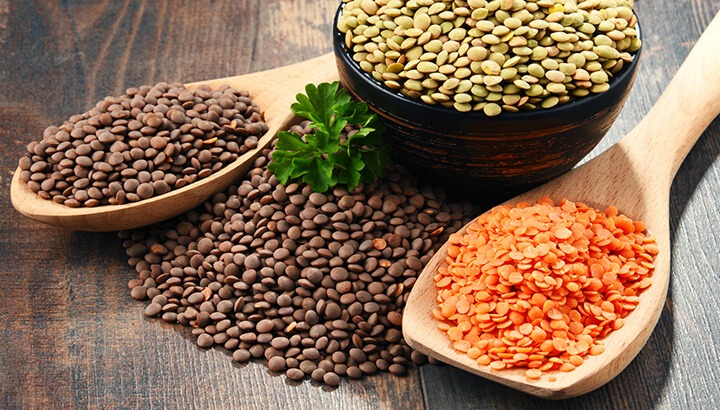A half cup of lentils a day could help keep diabetes away. That’s the conclusion of a new study, published in the Journal of Nutrition, which found that substituting one serving of lentils in place of starchy carbohydrates like rice or potatoes helped reduce blood glucose levels by 20 to 35 percent.
The health benefits of lentils
In a moment, I’ll discuss these findings in greater depth, including the implications for your health. But first, here are some additional reasons you should consider adding this versatile legume to your diet.
- Lentils are an excellent source of plant-derived protein and essential amino acids, which are critical for the growth, repair, and smooth functioning of your muscles and tissues.
- Lentil (and legumes in general) are fiber-rich. The roughage in lentils helps lower serum cholesterol while powerful antioxidants counteract cellular damage caused by oxidative stress. This powerful one-two combination makes lentils extremely beneficial when it comes to preventing cardiovascular disease.
- Lentils are a source of plant lectins which have been unfairly demonized in the media recently. Studies have found that plant lectins like the ones found in lentils are not only perfectly safe but they induce cytotoxicity and apoptosis, which means that they can help neutralize cancer cells.
- Lentils are loaded with heart-healthy nutrients like magnesium and potassium. Magnesium is nature’s “chill pill” because it is involved in the biochemistry of the stress response, it relaxes muscles, improves sleep, and can even lower blood pressure. Likewise, potassium is a nutrient that helps relax blood vessel walls while counterbalancing excess sodium (which can raise blood pressure).
- Lentils have a low-glycemic load. They offer high-quality complex carbohydrates, lean protein, and soluble fiber, which collectively means that eating lentils will not cause a sharp rise in blood glucose levels.
Lentils lower blood sugar
The sharp increase in diabetes rates is one of the most serious health issues of our time. According to a recent report by the CDC, more than 100 million Americans now have diabetes or prediabetes.
But here’s some good news. This devastating condition is 95 percent preventable. Better diet and more physical activity can be key. Avoiding processed foods and sugary snacks are among the most important steps you can take. But including more lentils and legumes in your diet can make a huge difference, too. That’s because lentils are nutrient dense and they contain fiber and other compounds that help slow the release of sugars into the bloodstream.
Final thoughts
The recent study mentioned above examined how swapping half of a serving of a starchy carbohydrate like rice or potatoes with lentils had a significant influence on the post-meal blood sugar spike. Because of their protein and fiber, lentils will improve the response to carbohydrates by slowing down the absorption of digested carbohydrates.
As lead researcher, Dr. Alison Duncan explains, “This slower absorption means you don’t experience a spike in glucose. Having high levels over a period of time can lead to mismanagement of blood glucose, which is the hallmark of type 2 diabetes. Essentially, eating lentils can lower that risk.”
Lentils are loaded with phytonutrients that will do your body a world of good. But they are more than just nutritious, they are also delicious, heart-healthy, and great food for managing your blood sugar levels. Whether you add them to soups, stews, or casseroles (or use them as sides) fiber-rich lentils are one of the best foods you can choose to help keep chronic diseases like diabetes at bay.
Take good care,
Dr. Josh









